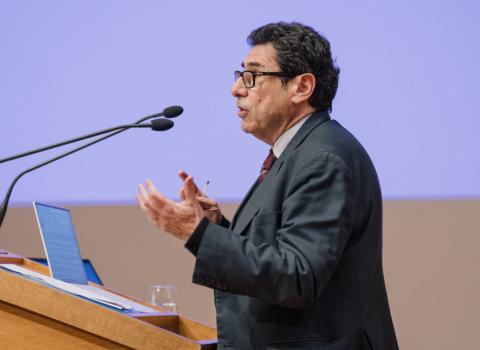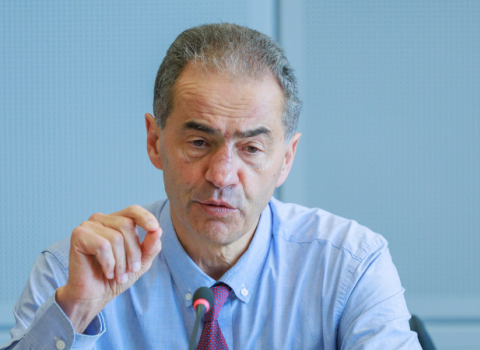Maria Leptin worries standardised processes will put the funder in an administrative straitjacket

ERC President Maria Leptin. Photo credits: Jennifer Jacquemart / European Union
A European Commission plan to standardise administrative processes for EU research funding could spell “death,” the president of the European Research Council (ERC) has warned.
Maria Leptin said that different EU research bodies had different aims and so need flexibility. Standardising their contracts, for example, could put them in a straitjacket.
The “danger” of a common rulebook, proposed by the Commission in July in its plans for the next Framework Programme, is that it risks “death to all programmes,” she said at the Hamburg Science Summit on September 18.
The Commission’s logic is that a single rulebook of procedures will simplify access across a myriad of programmes.
It “might look like a positive step,” Leptin told delegates during a panel discussion of the tenth Framework Programme (FP10), set to start in 2028.
But for EU research and innovation programmes, “it's not, because we don't have common aims.” The Framework Programme spans research missions, supporting SMEs, funding research consortia, and individual grants, she said.
All these need “different tailor-made mechanisms made by experts in the field,” she went on. Leptin said she had raised the risks of a common rule book with Commission officials. The Commission has been asked for comment.
The reason for the success of the ERC is that “we don't use any of the mechanisms that are used elsewhere in the Commission. We have panels that are hand-picked by an independent scientific council,” she said.
Other parts of Horizon Europe, by contrast, used “volunteer” experts to judge proposals, she said. While this is “very democratic, very grassroots,” Leptin said, it makes them “unlikely” to be ERC grant holders, for example.
A single common rulebook of processes could hit ERC panellists and applicants, she said later.
For example, she said the ERC had previously moved to make its assessment panel members’ identities public, she said, and had tweaked its contracts to make this happen.
Related articles
- Nobel laureate calls for tighter focus in EU research funding
- Experts defend ERC from Commission overreach in FP10
But under common rulebook, this kind of flexibility over how to hire outside experts would be impossible, she said.
The ERC needs “a protected independence” not only “in setting strategy, but also in setting implementation,” she said.
“It's not that anything is wrong with the aims of the rest of the Framework Programme,” Leptin told delegates. “It's the mechanism. It's the mechanism by which excellence or successful projects are selected.”
Leptin also bemoaned the fact that the ERC was not to be given a bigger slice of FP10 than it has of the ongoing programme, Horizon Europe.
“Out of 17% of the total [Horizon Europe] funding, the majority of patent cited literature comes from the ERC,” she said, without giving a source for the figure.
She also said that “we better be careful” and not be “naïve” about close links between a mooted European Competitiveness Fund and FP10, which some university lobbyists worry could mean greater Commission control over research priorities.





 A unique international forum for public research organisations and companies to connect their external engagement with strategic interests around their R&D system.
A unique international forum for public research organisations and companies to connect their external engagement with strategic interests around their R&D system.